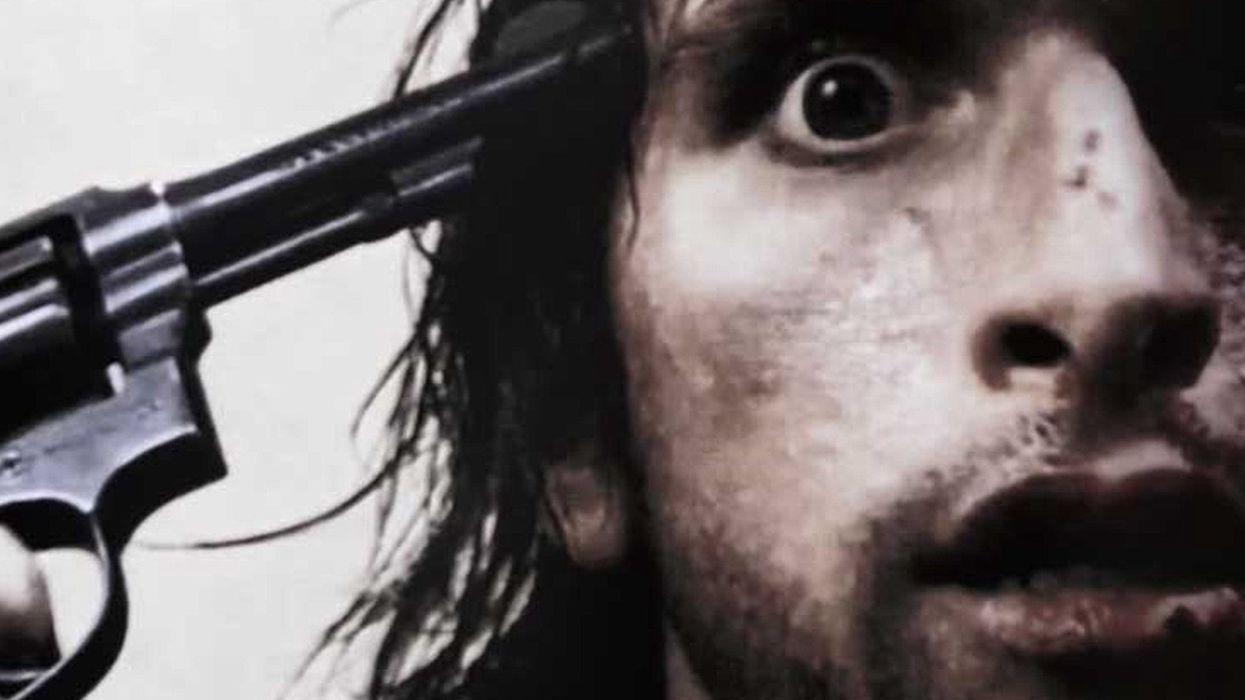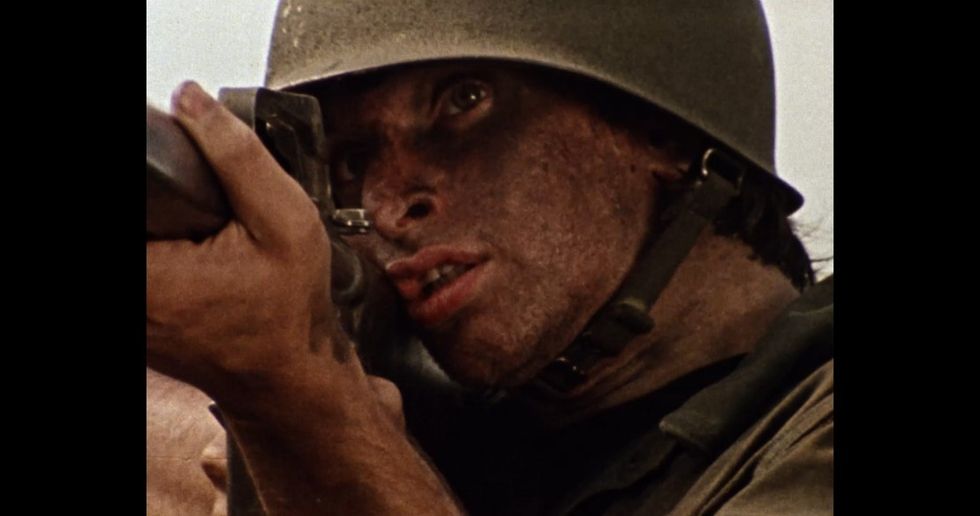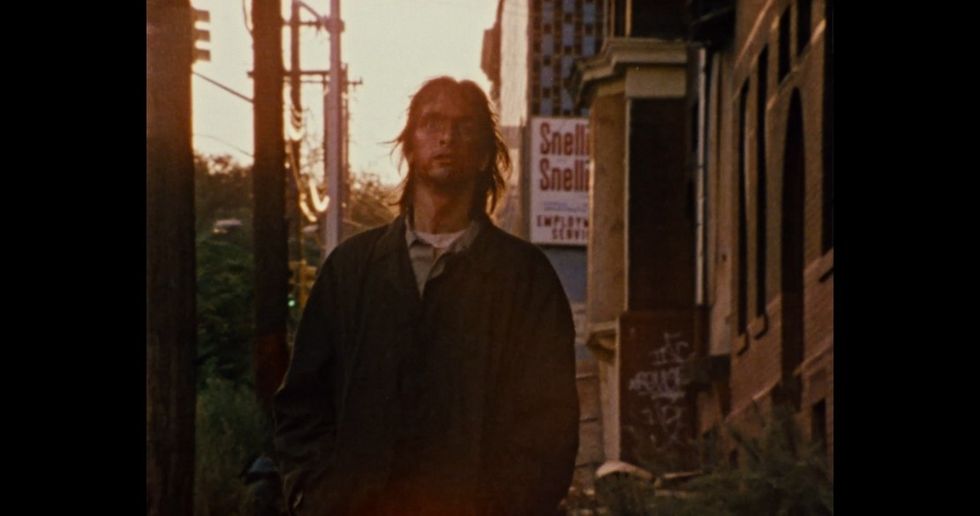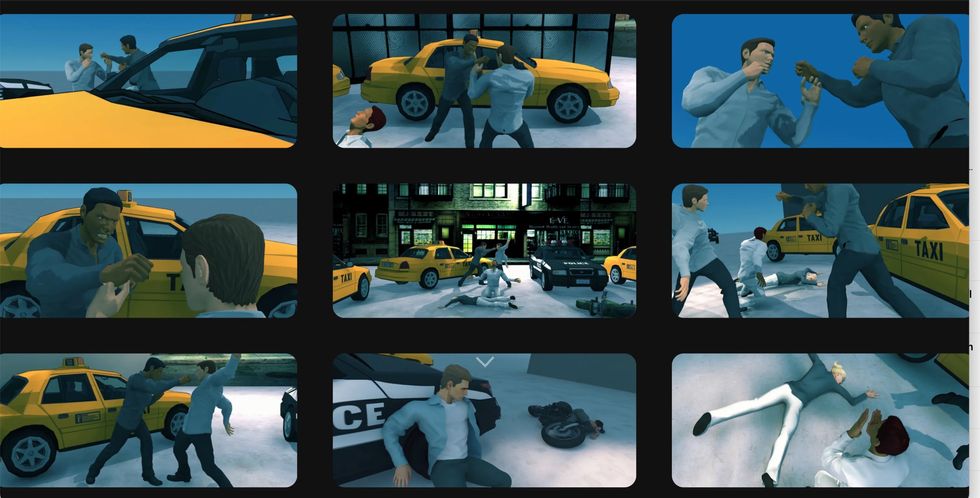How Cult Filmmaker Buddy Giovinazzo Started an Uncompromising Career with 'Combat Shock'
Buddy Giovinazzo is the outsider with whom every young filmmaker should acquaint themselves.

Buddy Giovinazzo made one of the most enduring cult films of all time, managed to build a career out of persistence and without compromising, and could create a brilliant piece of genre-bending art for the change in his pocket. His story ought to be taught to young kids with cameras everywhere because it's one of innovation, shoestring budgets, intelligence, and improvisation—the kinds of things young filmmakers need to know how to roll with. The man carved out an unlikely niche for himself working in German TV and he hasn't lost the humbleness that comes from a Staten Island upbringing and a career that began in short films.
Combat Shock is his infamous satirical surreal feature debut, one of the last true grindhouse movies. It took a long time to take hold, culturally, as he'll tell you, but those who have seen it won't forget it. In it, his brother Rick (who has composed the music for just about everything Buddy directed afterwards) plays a Vietnam veteran struggling to survive both the brutal streets outside, loaded as they are with addicts and grifters, and his depressing little apartment where he and his wife fight each other night and day while his mutant baby wails constantly in his crib. Now, there's a new Severin Blu-ray release of Combat Shock (originally released by Troma Entertainment), and it's a must-own for die-hard fans of the bizarre.
When I call Giovinazzo to interview him about the Blu-ray, which is flying off the shelves, he starts by asking about me.
"Your name is very familiar to me. Have we met?"
"I don't believe we have, sir. I make video essays?"
His good nature and genuine curiosity about me is so heart-warming I forgot how I was going to begin the interview. Thankfully, he gives me a little extra time than we'd planned. Anything to help people learn from his extraordinary example. After he cajoles a couple of essay titles out of me he hears that I've stumped for Sorcerer and I can almost hear his face light up over the phone. "Sorcerer's one of my favorite Friedkin films. Think about it. French Connection, Exorcist, Sorcerer. After those three films, you could just drop dead and be completely happy!" He laughs, but he's not wrong. "Those three films, one after the other…they're so powerful, three of my favorite films."
No Film School: I notice a little French Connection in Combat Shock, were you thinking about it while directing?
Buddy Giovinazzo: No fuckin' way…I saw it with my father, I couldn't imagine a film better than that. When I was making my film I was thinkin' of John Waters and Taxi Driver. I wasn't thinking Kubrick or any big work of art, I was much closer to John Waters. Pink Flamingos and Female Trouble. When I would watch French Connection or The Exorcist I'd be totally frightened by the thought of trying to do something like that. It seemed insurmountable, impossible to make something so good. But I saw Pink Flamingos and I thought "Holy shit! This is just a guy and his friends makin' a movie about bizarre things! I can do that!" If I had any model it was John Waters, Taxi Driver and Eraserhead."
NFS: We look back at movies like Pink Flamingos and Combat Shock and there's a lot of nostalgia for those times now when movies and cities were covered in a layer of grime, especially now that our genre films are so much less gritty.
Giovinazzo: I feel bad for kids now; in a way I'm happy to be old. I grew up in a time when people weren't concerned about money. I don't mean just a group of people it seemed like when I was growing up. When I was young filmmaker in my 20s and 30s money wasn't anything we chased. We were all pretty much in the same boat. In New York I didn't think I knew any rich people but I realized later I knew a lot of rich people! Their fathers were lawyers or whatever but nobody showed their wealth, we all dressed the same. We could be eating a 75 cent falafel on Avenue A with a guy whose family was worth ten million dollars and he didn't have a care in the world.
Whereas today it's so much about consumption. It's meaner today, it's "I've got this and you don't." Of course, we had assholes back when, but… I lived in the East Village when you could afford to live in the East Village. It was filled with artists, musicians… Of course, you know the Cinema of Transgression, Nick Zed and Richard Kern. That's how everybody was. Everybody looked like Nick Zed in the East Village. It's hard today, I don't want to glorify it either, let's face it the city was violent, it wasn't a picnic, but when you're young it doesn't seem dangerous.
"I saw Pink Flamingos and I thought, 'This is just a guy and his friends makin' a movie about bizarre things! I can do that!'"
NFS: Combat Shock does try to showcase a lot of that danger. It's about poverty, PTSD, addiction, but it's almost a complete anomaly because it's dark and it's gritty but it's also hilarious. There's a satirical edge to it.
Giovinazzo:You're one of the very few people who've mentioned humor with regard to Combat Shock. I find it very humorous, I made with humor. The sour milk [A scene in which the hero drinks sour milk is one of the things that John Waters loved the most about the movie when he watched it], the wife says "We got milk, drink it." Over the years I say to people "Don't you find it funny?" and they think I'm completely nuts because it's so depressing.
My whole thing was I wanted to do something that nobody else was doing. They were gonna do Platoon, they were gonna make movies about heroes. I was influenced by Fassbinder, he had a huge impact on my storytelling. His films are so nihilistic and depressing, the first time I saw one of his movies it left me traumatized at the end! I was blown away because I didn't know you could end a film on such a horribly tragic note. Where everybody loses and everybody gets fucked. That had an influence on Combat Shock even though my style isn't like Fassbinder's.

NFS: You've worked a lot in Berlin in the years since Combat Shock, which was home to many a Fassbinder film, was that somewhere in the back of your mind when you moved there for work?
Giovinazzo: No way. I spent ten years in between Combat Shock and No Way Home [his second feature, starring Tim Roth and James Russo]. I had a bunch of projects I wanted to make but every time I showed Combat Shock to a company or a producer I lost the job. That's the truth.
I had a film I wanted to make for years called 123 Depravity Street. It was an erotic thriller and I had a few chances along the way but every time they said "Ok lemme see your feature," I'd lose the job. I lost the chance to make Charlie Band movies where the directing fee was $5000 for two weeks in Burbank. A good friend of mine Jeff Burr was doing these films for Charlie Band, one after the other, low-budget films for like $200 or 300,000. This was in the '90s and to me $5000 was a ton of fucking money. Band was working with first-time directors except for Jeff, who'd made a couple of movies. Jeff's a good friend so he brings me down to meet everybody and I'm thinking "I've got this" because I've already made a feature. My feature got released, even! But one look at Combat Shock and that was it!
That's a sidebar but anyway, I started to tour Germany with No Way Home, every two days a new city, sometimes two cities in one day, but when I got to Berlin I fell in love with the city because it reminded me of New York back in the '80s. Reminded me of the New York of Combat Shock. I loved it, it was simple and nobody had money. You could work in a cafe three days a week and pay your rent. It was a beautiful life. I was in LA for three years after No Way Home and I couldn't get work because No Way Home didn't make any money. In LA if your film doesn't make money you're pretty much fucked. There were people who liked the film and there were even companies that wanted to work with me but without the financial pedigree they couldn't bring me into the company. Three years in LA until finally I got the chance to move to Berlin for three months and live for free and I went and after three weeks I decided to stay. I left my career behind, didn't know what I was gonna do but then a German company in Munich got in touch. They were huge fans of No Way Home and asked if I wanted to work with them. So then I had to learn German. Most of my movies these days are in German, they don't export. But the first film I made was in English with James Russo.
NFS: The Unscarred, right, there's a little French Connection in that with the car chase on the busy streets.
Giovinazzo: It wasn't my script, it's a little cold for my tastes looking back. I like a little more heart and soul in my movies. I mean that's why we're still talking about Combat Shock 30 years later, right? People relate to that. The Unscarred was cold. I'm glad I made it. I made a film with Udo Kier where he speaks German, his mother tongue. I was making a serial killer movie for a German producer and we really pushed the violence as far as we could take it on TV. The producer would call me furious and say "The dailies gave me nightmares!" And I said, "It was all in the script, you said yes to the script!" "Yeah but it looks different now!" I loved that. "But it looks different now!"
"I like a little more heart and soul in my movies. I mean that's why we're still talking about Combat Shock 30 years later, right?"
NFS: You worked with Udo in a roundabout sort of way on the omnibus film The Theatre Bizarre (2011). You do a lot in 20 minutes in that one.
Giovinazzo: That's my favorite of my own films. I wish it was a feature. My biggest regret. My wife and my assistant director produced the thing. We had $26,000 to do the entire thing. Prepping, production, post, that was it. My wife pulled together this tremendous crew and I remember thinking "If I only had ten more days" I could do this as a feature. I thought about going back to it and expanding it but it is what it is. It'd be like going back to your kid and trying to add another arm.
NFS: It feels pretty perfect as it is, so compact and so messy. You're once again dealing with romantic bonds getting you in trouble as you do in Combat Shock and No Way Home. That thread, not knowing when to say no to people who mean something to you, runs through most of your work.
Giovinazzo: I love films about marriage and families. That dynamic can be tremendous, to look inside a married. It's so interesting to me.
NFS: Fassbinder loved to talk about that as well. Makes me think of Ali: Fear Eats The Soul.
Giovinazzo: That's my absolute favorite. I've seen all 41 of his movies but that movie destroyed me. Bitter Tears of Petra Von Kant and Ali: Fear Eats The Soul are my favorites. Such a brilliant masterpiece.
NFS: What about the ending ripped you apart?
Giovinazzo: It's the truth. That's what Combat Shock is. My whole thing is "Just tell the truth." Don't try to commercialize it, don't make it happier, don't try to please everybody. And you know I like to feel good sometimes when I leave the theatre but the other part of life is that it sucks. Look at what's going on in the world right now! I think that's what it is.

Giovinazzo: I've thought about that, where to go and how to stay true to yourself. There's a few things. I could almost see doing likeAmerican Psycho, going that route, on consumerism today and how it leaves everyone feeling heartless and dead. That'd be one thing to do on a higher level financially. The other thing would be the opiate crisis in Virginia or even in my hometown Staten Island. Staten Island is one of the heroin capitals of the world and it's mostly white people doing it. I lived in a pretty drugged out neighborhood on the Lower East Side back when but drugs are just different now. Back when I was living in the States, heroin was really expensive, if you had a heroin addiction you were looking at a hundred dollars a day. You had to constantly rob houses and hustle to afford that habit. Nowadays heroin costs five or 10 dollars. It's available to everybody. People get hooked on prescription pills and run out and then heroin's available to them for cheap. I could get pretty deep into that, but I don't have a story for that. I have a horror piece called Manifestations I'm trying to find funding for right now. It's tough.
NFS: Tell me about what it was like releasing Combat Shock.
Giovinazzo: I had just finished the film and the gaffer had just worked on a Troma film called Splatter University and he'd worked with those guys and said "You should send this to Troma." They were the first company I sent it to. The director of Splatter U. brought to the company and screened it for them and they passed on it, so I took it to a few other places. Took it to a company called 21st Century, brought it to Terry Levine's company. I tried to sell it for years, tried to get it into festivals, but man we were rejected from like 50 festivals. I thought it was an art film I didn't think of it as a horror movie. I mean I grew up with horror, I saw Mark of the Devil when they were handing out promotional puke bags to the audience!
But nobody wanted the movie so I said "Fuck this, lemme give Troma another try." I called them and this time I got Lloyd Kaufman [head of the company] on the phone and I said "I think you should reconsider my film," and he says "What film?" He hadn't seen it. So whoever screened it at Troma didn't show to Lloyd or Michael Herz, so I got a 16mm answer print and sent it to them, and they loved it. They were looking to up their game. They were known for cheesy horror, they were looking for something with a little more substance. They guaranteed me a 35mm blow-up and a theatrical release. It was beautiful. I had to live with a name change and a poster that looked like Rambo. And I went with that because I understood their concerns. Initially, I said "They're gonna think this is an action movie" and Lloyd said "We're just trying to get them into the theatre, once they're in the theatre they're gonna love your film." Now that didn't happen. It was dead for three years and then this journalist Steve Bissette for Deep Red wrote this long article about it and people rediscovered it.
My whole thing is 'Just tell the truth.' Don't try to commercialize it, don't make it happier, don't try to please everybody.
NFS: How did that compare to the last film you made, trying to get that released.
Giovinazzo: Well, the last film I made Night of Nightmares, never got released, it was a horrible experience. I'm proud of the film I like the film. It was made for a producer and financier who didn't like horror. He thought he was gonna make this low-budget film for $100,000 and then make a million dollars, he was trying to chase Paranormal Activity. But I made a movie that was character driven and he didn't like the character stuff, he wanted a guy with a knife chasing girls in bikinis. He wanted a bad exploitation film out of the '80s. I tried to tell him no one would sit through such a thing. "We have evolved. We require character and dialogue."
It was a hard film. I got to shoot my film, I had just about final cut. The producer looked at it and wanted horror right at the beginning, wanted all this action…I can't even describe it. He was a good guy, I like him, we didn't fight or anything. When it came time to release it they recut it and they reshot this opening scene that looks like a porno film. It really hurt. They can't sell my version now, it's too old, distributors won't touch it after a few years on the shelf. I was excited to do a pure genre piece. Combat Shock wasn't accepted by the horror crowd at first, wasn't covered by Fangoria or any of those places at first. It was only after a few years that it became part of the horror family, which I loved, I'm a part of the horror family. But that didn't happen at first, it was an outsider, it wasn't an art film and it wasn't a horror film.
NFS: So distribution hasn't changed all that much then?
Giovinazzo: It's gotten worse! Now with Netflix and Amazon, they pay nothing and then North America's gone. Used to be you'd make a film for a million dollars and recoup. But because of the rates these companies are paying there's no way to get the money back. The million dollar film has become the $300,000 film with HD and final cut pro, you can mix at home.
I was on film sets in the mid-'90s and people were making $100 a day on a low budget, indie film. If you were the boom guy or the sound guy or whatever, you had a real job you were making a hundred dollars a day. In 2012 I'm doing Night of Nightmares for $100,000 and I realized we're paying the crew on that $100 a day which is what we paid 20 years ago. Nobody got a raise in 20 years. The difference was on Night of Nightmares we had students and people who didn't know what the hell they were doing. In the '90s you could get real technicians who wanted to work. If you sell yourself to Netflix for North America you can't recoup your budget because they don't pay enough. It's really rough...
NFS: How about the German TV productions? Do they pay better?
Giovinazzo: Well I never made any money directing my own movies, so yeah. I make a 90-minute crime film for German TV and the budget is 1.5 million. That's basically what a low budget movie was back in the day, that's what Jim Jarmusch used to work with. That's what German TV is like now. But you get the toys, you get the crane, you get the Steadicam, you get a real German crew. I feel restrained working in German TV because I can't express really what I want. You know, my whole thing "tell the truth," if you tell the truth you really can't go wrong. You may upset people, you may piss them off, you may not have success, but the fact is as an artist you have to tell the truth. For German TV I'm not making a Buddy Giovinazzo film, I'm working for an audience that doesn't necessarily want to be devastated or sad at the end of it. In some ways I'm happy to do it, I fill out my tax returns every year I write "Filmmaker." Great. But they're not my films.
'Combat Shock is currently available on Blu-ray from Severin Films.




















